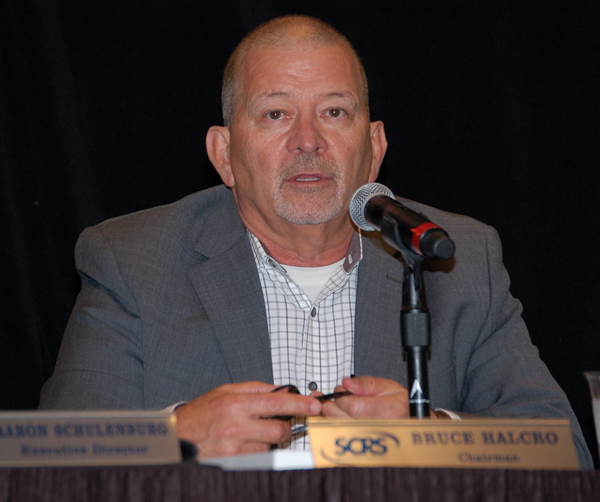Three auto body shop owners spoke during the recent Society of Collision Repair Specialists’ Repairer Roundtable about their efforts to build a positive culture within their companies.
Bruce Halcro of Capital Collision Center in Helena, MT, said a change in pay plans was one step he took a few years ago.
“We were paying flat rate, and it created more divisiveness than anything,” Halcro said. “Everyone was doing their own thing and saying, ‘That’s not my job.’ So we switched everybody to hourly, working out a pay plan that got them as close as we could to the flat rate that they had.”
Halcro said he tries to get out to each technician’s work area every day to talk with them briefly.
“Sometimes it’s about the car they’re working on, but most of the time it’s about family,” he said. “I think that’s an important connection to have with employees. I think how you treat employees, showing them that you value them, really builds a culture.”
One thing Halcro said has surprised him was the impact on his company’s culture he’s seen from its sponsorship this past year of a youth hockey team.
“So we had our own section, a ‘Capital Collision section,’ at the games,” he said. “We actually hired a couple of the players to come in a couple hours a day, twice a week, to clean the shop, empty garbage. By the end of the year, almost our whole crew was going to these hockey games. By Wednesday, they all would be talking about who was going to the hockey game that Friday night. Honestly, that was one of the best team-building things that we’ve done, that’s been impactful for our youngest employees to some of our older ones.”
Ron Reichen, owner of Precision Body & Paint, which is opening its fifth location in Oregon this year, said part of developing his company’s culture involves having second-year students from a local community college collision industry training program spend their three-month co-op at one of his shops.
“We try to have them touch each one of the different disciplines within that 90 days,” Reichen said. “So they get to see where their appetite might be. During that 90 days, they’re learning the culture. They’re learning to come to work on time, to keep their work area clean, to read the OEM repair procedures, to read and follow the repair plan. They understand they’re part of a team.”
Other entry-level hires often start off in a shop’s parts department, with opportunities for a career path laid out up front.

“You’re not going to be stuck on the wash rack or with a broom the rest of your life,” Reichen said. “If they demonstrate a good work ethic, then our master technicians will say they are interested in taking on this person, being a mentor, to grow them, whether their interest is on the refinish or body side or mechanical.”
He said getting on a collision repair training program’s advisory committee is one of the best ways both to find entry-level employees and help with the industry’s overall technician shortage.
“We also look at the high schools with the SkillsUSA program,” Reichen said. “We find that even though a high school may not have an auto body or refinishing program, they may have a mechanical program. And with our industry changing, with more and more calibrations and ADAS and things like that, there’s opportunity there. You have to get creative.”
He said his company also works with those being released from a state penitentiary. “That involves a certain amount of calculated risk,” Reichen acknowledged. “It’s a lot of work, but we’ve had a pretty good success rate with doing that.”
Andy Tylka of the Tag Auto Group in Indiana acknowledged it has been a challenge maintaining his company’s culture while growing the business from six shops to 15 over two and a half years.
“But those people decided to sell to me because our culture was very similar to theirs,” Tylka said at the SCRS event. “A single-family-owned culture. Knowing everyone’s name, having those conversations, knowing something about everybody’s life, them knowing your life.”
He said rewarding loyalty is extremely important. “There might be a shop that needs a technician and they’ll just load [the new hire] full of benefits and pay, while disregarding the loyal employees who have been there all along,” Tylka said. “I need to do a better job of that as well.”
Growing your own new employees is a great way to instill your culture, he said. He spoke at several Indiana Auto Body Association chapter meetings last year to share details about his company’s apprenticeship program, including how it’s structured, the check-off lists of what apprentices need to learn and how to find apprentices, not just through auto body job boards but those for construction and plumbing, etc.

“Because there are people in those trades who are having a bad day or are looking for another industry,” Tylka said. “What shocked me was through all the chapter meetings, there were only two shops that had a structured apprenticeship program. All the others were deterred from getting apprentices because they just didn’t know what to do with them.
"I think that’s what the industry needs is at least some kind of guideline to give a mom-and-pop shop some direction as to apprentices other than just putting a kid with a technician and hoping they learn something," Tylka said. "I’m hoping as our apprenticeship develops to share that within Indiana, and that will start to have a snowball effect.”










John Yoswick